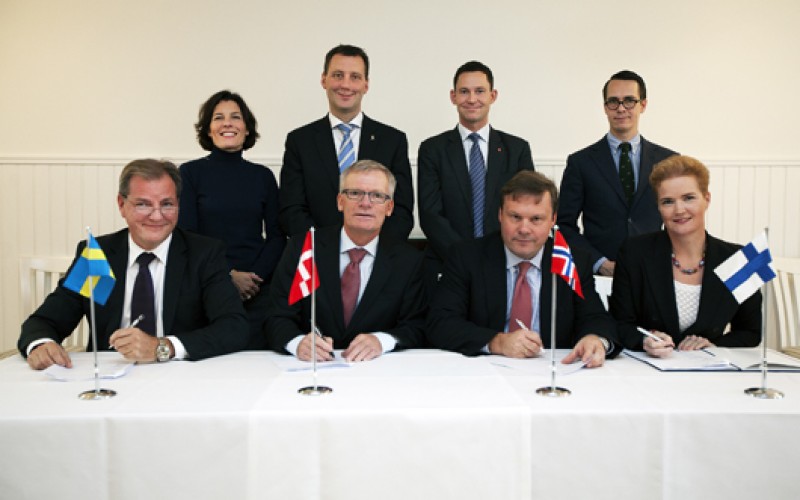The five Nordic defense ministers announced last week the beginning of extensive military cooperation between their countries, arguing that Russia is currently the biggest threat to European security.

In a declaration published last week, defense ministers for Sweden, Denmark, Norway, Finland and Iceland announced the beginning of extensive military cooperation between the Nordic countries.
Under the new agreement, joint military exercises are to be held regularly, and the Nordic arms industry will increase cooperation. Military intelligence agencies will participate in a program for information exchange, with greater Nordic coordination in international operations.
The joint declaration came as a response to growing Russian military activities, arguing it had impaired the security situation in the Nordic region and should be considered the biggest threat currently facing European stability.
Politically close, militarily distant
Preceding the European Union, the Nordic model has been a successful example of regional cooperation and integration. The five countries have solid political cooperation, enjoy a high degree of economic interdependence, and share similar models of arguably successful democratic governments.
The strong regional identity is facilitated by similar culture, languages, and a shared history. Yet, the political cooperation, institutionalized in the inter-parliamentary body Nordic Council or the pre-Schengen Nordic passport union, has never had a counterpart on the military level.
Partly due to historical reasons, the armed forces of the five countries have traditionally enjoyed friendly, yet distant, relations. A key difference has been between Norway, Denmark and Iceland’s longstanding membership of NATO, in contrast to the official neutrality of Sweden and Finland.
Sweden continued its policy of non-alignment after the Second World War, but developed significant military capabilities under the doctrine on self-reliance. Finland’s complicated relationship with the USSR resulted in the curious position of enforced neutrality, while at the same time maintaining a doctrine of total defense.
Shared military bases and information exchange
The new defense framework set forth will increase cross-border training and aims at establishing a regular aviation exercise called Norther Flag. It will also allow the air forces to share base facilities, which have become scarce as a result of severe budget cuts following the end of the Cold War.
The countries will establish improved mechanisms for joint monitoring of the Nordic air space. All the Nordic countries have witnessed a significant increase in Russian air activities near their borders, with a particularly dramatic increase in the Baltic Sea region.
In 2013, Sweden was totally unprepared when Russian aircrafts simulated a mock attack against Stockholm. Though NATO planes successfully intercepted them, the incident highlighted the extent to which the Swedish Air Force had been downsized over the last decade.
Since the annexation of Crimea, the Baltic States have also been concerned by the new military reality proclaimed by Moscow. As a result, the recent declaration also calls for including the Baltics in the new Nordic Defense Cooperation. They already participate together in the EU’s 2500-man-strong Nordic Battle Group.
Europe’s military preparedness has been criticized ever since countries began downsizing their armed forces at the end of the Cold War. Yet it was only with the Ukraine crisis that the continued need for a functioning military was brought home to most European governments.
Russia’s efficient invasion of Crimea and the lightning deployment of tens of thousands of soldiers on the border with Ukraine shocked and surprised analysts and policymakers. The EU’s military component is far from a real replacement of the US-led NATO Command Structure, which has also faced concern over it’s ability to sufficiently deter Russian capabilities and intentions.
Russia calls the move confrontational
The Russian Defense Ministry accused the Nordic countries of adopting a “confrontational” approach that threatens to “undermine the positive relations that has been created in the North over several decades”, and emphasized that the new engagement between NATO and Finland and Sweden are “particularly concerning” to them.
The most surprising element of the Nordic announcement was the bluntness with which it publicly branded Russia as the biggest security threat to European security. Nordic countries have spent decades trying to engage Russia in what is frequently dubbed “positive dialogue,” and have generally gone out of their way to assure the public that they do not regard Russia as a threat.
The declaration will not result in any real strategic differences in the Nordic region for now. For one, the mix of NATO and EU member states makes deep cooperation impractical and complicated. The modest defense capabilities of the Nordic countries also means that the governments needs to show a willingness to increase their defense budgets before actions will match rhetoric.
It should be considered significant, however, as the Nordic countries have for the first time aligned themselves politically against Russia, opening the door for a military alliance with the same purpose.
sourche: http://globalriskinsights.com/2015/04/nordic-defense-cooperation-to-counter-russian-threat/
Δεν υπάρχουν σχόλια:
Δημοσίευση σχολίου